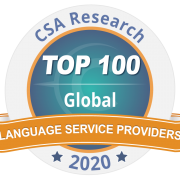Demand For Translators Is Growing
Thanks to expanding connections around the world, there is a growing need for people who can translate other languages. Gone are the days when Spanish and French were the most important languages learned due to the proximity of Mexico and Canada to the United States. Now, there are over 350 different languages spoken in this country.
Translation from a foreign language to a native tongue is common. In fact, there are plenty of computer programs that can help you translate things on your own. But how good are these programs? Truthfully, they’ll give you the basics, but there’s a lot that gets lost in the translation
Benefits of Being Human
Only a human being can achieve the highest level of professional translation. Here are some of the top reasons why:
Lack of words. Some languages have words that have no translation. Plug it into a program and you’ll come up short. Or worse; you’ll come up wrong. When an important conversation is on the line, you want a human who can find the best word to meet the need.
Lack of culture. Computer programs don’t care how their words are received; humans do. When it comes to persuasion and negotiation, a human translator can add personality, panache, and culturally sensitive flair. This applies to having good judgment as well to know just when to push—and just when to back away.
Lack of experience. You can hire a translator with experience in your field that will understand the lingo and be well informed about the subject matter. Computers know nothing about making movies, baking cookies, wearing maternity clothing, or finding the right part for a motorcycle. But humans do. The personalization a human brings to translation will never be found in a machine.
This is why the demand for translators is increasing. Technology is great, but only as a tool to help humans communicate better. Replacing the human factor is not where the world is headed.
The Growing Need
The number of people employed in the translation and interpretation industry has doubled in the past seven years
CNBC reports that, “The number of people employed in the translation and interpretation industry has doubled in the past seven years” and it is projected to “grow by 29%” through 2024. This shows what a growing field translation is! And while we’re on the subject, it should be noted that there is a difference between translation and interpretation.
Interpreters convert spoken language from one person into a language that can be understood by another. The interpreter listens to what is being said, and then repeats it in the requested language. This is done in meetings, at conferences, or even over the telephone.
Translators convert written work. A translator reads a piece of material and converts it to the required language for understanding. This works for newspapers, magazines, contracts, and even computer programs.
At ITC Global Translations, we have over 2500 specialized translators who work on everything from legal translation to medical translation and more. As demand grows, so do we. If you need a translator for any of your documents, we’ve got the words, the culture, and the experience to help.






















Leave a Reply
Want to join the discussion?Feel free to contribute!